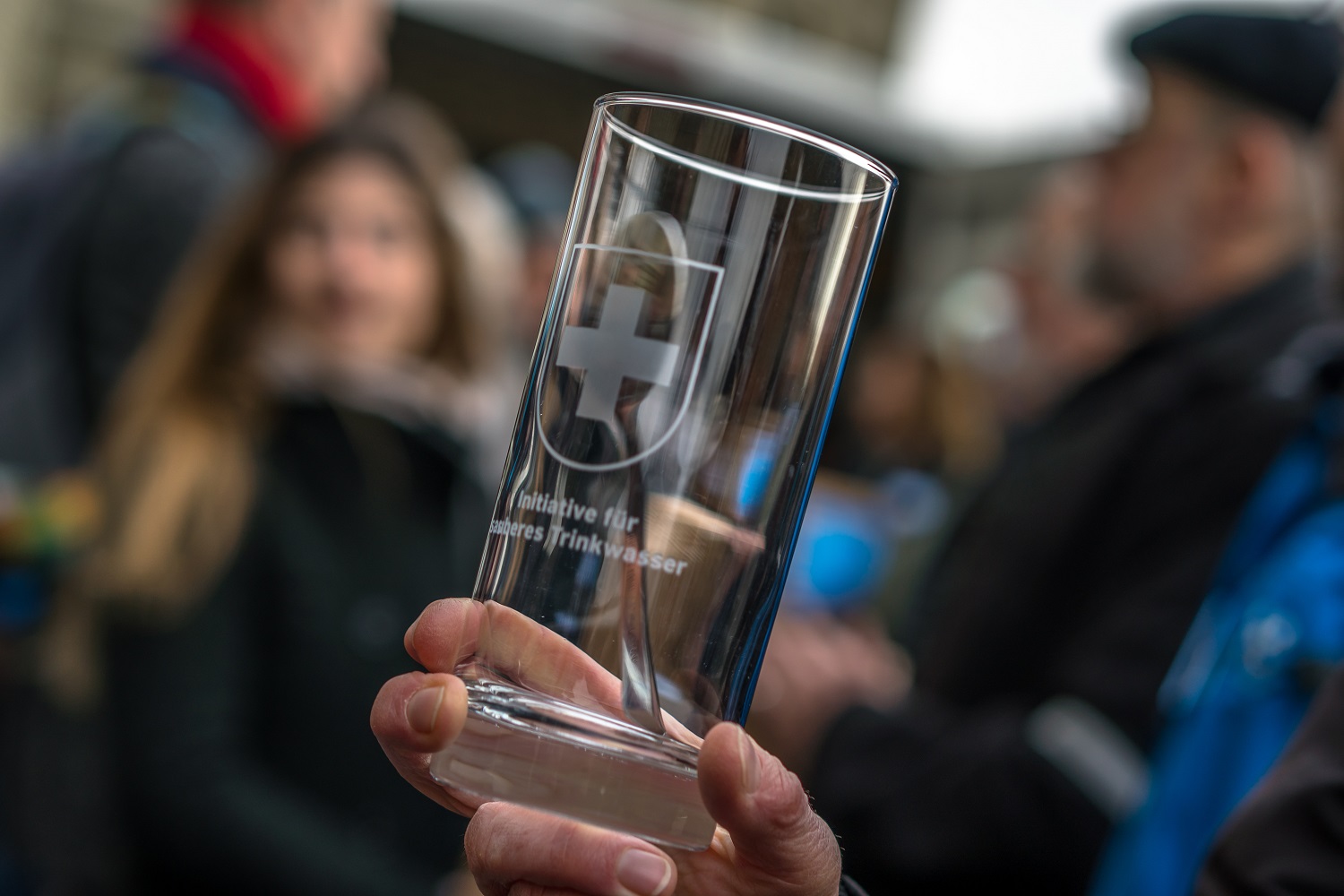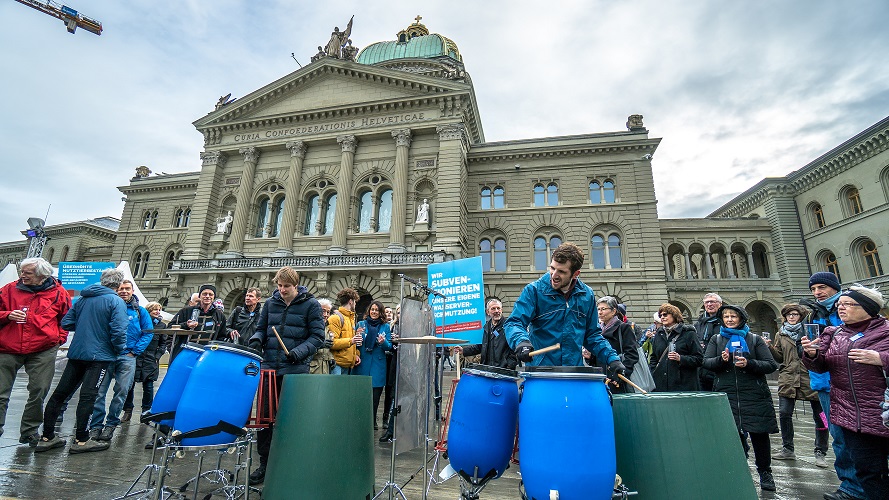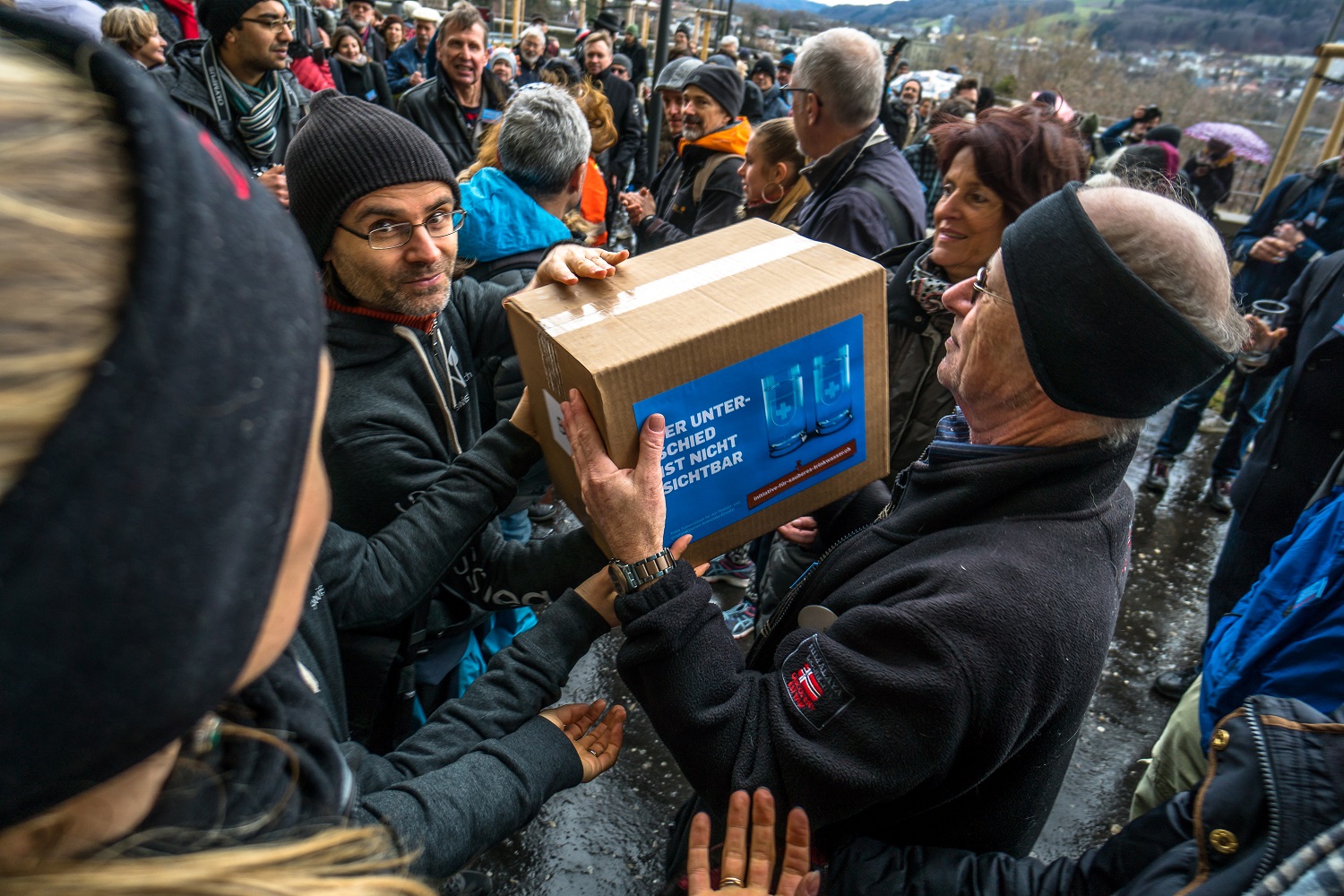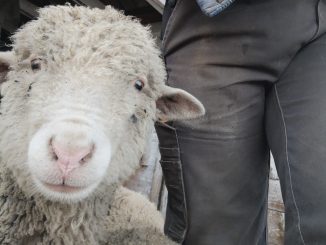 View on Luzern and Lake Lucerne from the top of Pilatus mountain, central Switzerland. Photo by Fabrice Blanc CC-by-SA 3.0
View on Luzern and Lake Lucerne from the top of Pilatus mountain, central Switzerland. Photo by Fabrice Blanc CC-by-SA 3.0
By Klaus Lans
Switzerland is well known for holding referendums. A new one that’s coming up asks for a change in subsides to farmers, towards supporting more ecological priorities. If the Clean Drinking Water Initiative passes, payments will go to farmers who don’t use pesticides or antibiotics, and who carry lower livestock numbers on their farms. Klaus Lans has more.
Switzerland’s legal framework grants unique rights to its citizens: any voter can initiate an amendment to the constitution (so-called popular initiative). 100,000 supportive signatures (out of 5.4 million voters) are needed, then government and parliament will have to position themselves to the proposition, and can either adopt or reject it. Parliament can also submit an amended text to the population. In that case, citizens get to vote both on the original proposition and on parliament’s amended text.

Lately, this legislative process has been initiated by a group of citizens, seven women and one man. Neither political parties or stakeholder organisations nor NGOs are formally supporting the initiative, mostly because they regard it as politically too sensitive. The proposed change to the Swiss constitution – termed Clean Drinking Water Initiative – aims to shift agricultural subsidies towards more ecological priorities.
The reasoning behind it is straight-forward: Swiss agriculture’s current environmental record is detrimental, especially with respect to water quality. Rivers and streams in arable land are loaded with a cocktail of pesticides, and lakes are eutrophic because of excessive disposal of manure and mineral fertilisers. Even groundwater bodies contain pesticide residues beyond maximum legal concentrations, with municipalities having to invest millions to clean up water or open up alternative resources.
At the same time, Swiss farmers obtain close to 3 billion Swiss francs (ca. € 2.7 bn) annually in federal subsidies, i.e. paid from citizens’ taxes. This is where the Clean Drinking Water Initiative (CDWI) kicks in. As agricultural subsidies are powerful economic incentives to shape production and markets, the CDWI focuses on stopping the subsidies that encourage the kind of agricultural practices polluting water resources.
Specifically, the initiative aims to modify the constitution to reserve subsidies exclusively to farmers who:
- a) apply pesticide-free practices
- b) limit their livestock to numbers that can be fed from the farmland itself or by buying feed from their region
- c) refrain from using antibiotics prophylactically
Hence, in a profoundly Swiss tradition, no new bans or standards are requested, but a simple shift of subsidies towards practices in tune with clean water and a healthy environment.
Furthermore, the initiative calls for biodiversity to be added to the overall objectives of food production, and Federal research money as well as agricultural education and investment aids to be re-directed to support the goals stated above. This an important aspect in order to create the favourable conditions for a sustainable agriculture.
So far, Swiss government and Parliament have rejected the demands put forward by the Clean Drinking Water Initiative. Yet, they acknowledge a need to improve agriculture’s environmental record. It is Swiss citizens who will have the final say, presumably in autumn 2020. With European farming subsidies currently being reviewed, many European citizens will follow the Swiss experience closely.
In Switzerland, popular initiatives are tabled quite frequently. There are usually several votes per year on different topics. Most initiatives initially have a lot of public support, but when financially powerful stakeholders and political parties invest in intensive counter-campaigns, support often dwindles and finally, most of them are turned down by the electorate. Whereas our initiative started small and has grown, so already our trajectory is different. Certainly we can say that the outcome is wide open.
Profound changes prior to referendum

Already, the initiative is changing the playing field of Swiss agricultural policies. Firstly, Parliament will have to decide on a new agricultural policy (AP22+) before the vote, and debates will take place with the initiative in mind.
Secondly, a lot more details about agricultural practices hitherto unknown to citizens are coming into the open. Conditions and intensity of meat and milk production have become matters of public discussion, as has the extent of pesticide and antibiotics dependency of the current system. Scientific institutes are publishing new data on the presence of pesticides and their residues in the environment and their consequences for aquatic ecology and drinking water supply. The entire public discussion about food production and agricultural practices has changed fundamentally since the Clean Drinking Water Initiative started.
The agricultural sector has started a fierce campaign to undermine the initiative’s credibility and plausibility. Government institutes have published several studies ‘proving’ the implausibility of the initiative’s demands, based, we contend, based on doubtful assumptions. The Swiss Farming Association has commissioned further studies and scenario calculations to document the disastrous effects the initiative would allegedly entail.
One main counter-argument is that a larger share of organic production triggered by the initiative would automatically lead to a collapse of organic prices, and to increased consumption of cheap imported food, negatively impacting on countless farmers ready and willing to convert to organic production. Consumers are being told that prices for Swiss produce will soar and become unaffordable for most.
On the other hand, the Swiss business think tank AvenirSuisse has recently published up-to-date figures on the extent of agricultural subsidies. They are substantial, an average of 54% of farm incomes are based on subsidies. People realize more and more to what extent their tax money is driving an unsustainable and water-polluting agricultural system. They also realize the lever of public subsidies in changing agricultural and food industry practices. It is precisely this lever that the Clean Drinking Water Initiative is putting to work: by rerouting the subsidy system towards a sustainable and water-friendly path.
Markets are also responding. First, in 2019, a large bakery chain declared to convert its entire production to flour from pesticide-free cultivation – with no change to retail prices. Meanwhile, the country’s largest retailer, Migros, with a market share of 36%, has announced to follow the same road to pesticide-free bread until 2023. The retailer said it would be willing to cover the slight price difference (no more than CHF 0.02 per bread) should Swiss agricultural policy shift subsidies towards a pesticide-free production.
And finally, the system of pesticide approval in Switzerland (which is semi-independent of EU registration) has come under intense pressure. Several pesticides and pesticide metabolites are found in drinking water resources at intolerable levels, others are of immediate concern to insects and aquatic fauna. Lately, the government has decided to review the entire, rather secretive approval system to introduce a more open, environmentally responsible and externally controlled system.
A Strategic Plan for Switzerland – the road to agricultural sustainability

Already today, the Swiss Constitution requires farmers to follow a «sustainable and market-orientated production» (Article 104). Hence, in principle, only farmers exhibiting an «ecological record» are eligible for direct payments.
The requirements to qualify for direct payments are however low. Hence, the Clean Drinking Water Initiative aims to introduce stricter conditions for direct payments. These additional conditions do not specifically prescribe how farmers should operate. They rather define principles with the intended objective to lower production intensity, reduce external inputs and lower animal stocks.
Whatever the outcome of the referendum, the campaign is already having a major impact on image, perception, and practices of Swiss farming, and on food markets. Consumers are becoming much better informed, and farmers willing to convert to organic practices encouraged and supported.
The agricultural policy for the years to come (AP22+) will have been framed with the initiative in mind. More than likely, the demand for organic food and the quality of products will increase, and so will water quality and the environmental record of agriculture – precisely the objectives envisaged by the initiators. In case of adoption however, food markets in Switzerland might shift to mostly organic within less than a decade.

Klaus Lanz, is a water and environmental scientist, International Water Affairs, Evilard, Switzerland.
For more on the Clean Drinking Water Initiative see the website (French, German and Italian)





